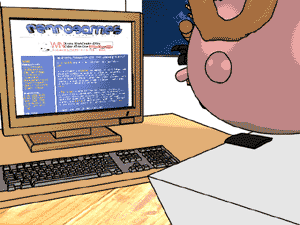 |
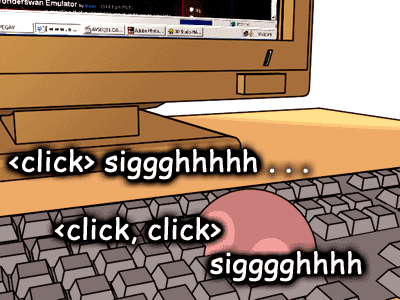 |
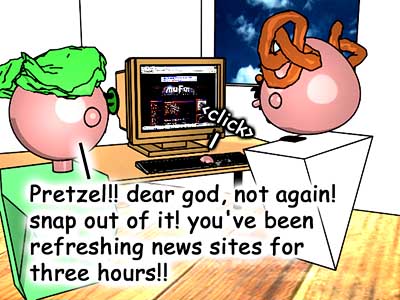 |
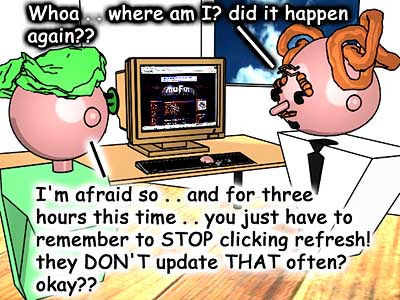 |
FINAL EDITION
copyright (c) 1999 Sam Pettus (aka "the
Scribe"), all rights reserved
All copies must not be altered in any way, including but not limited to reformatting and conversion to alternate document formats, without the express consent of the author. The sole exception is for necessary formatting changes that may be required to adapt this document to suit your particular needs; however, the complete original text must be retained in as close a layout to the original as possible. For any questions in this regard, please contact the author.
No copy may be reproduced in whole or in part within a for-profit commercial publication or Internet site without the express consent of the author. The author recognizes the right of said vendors to reproduce limited portions of his work under the "fair use" clause of the appropriate sections of the U.S. Copyright Act and the Berne Convention for the Protection of Literary and Artistic Works.
Any trademark or other such indica to be
found within this document is the exclusive property of its respective
owner, and is reproduced here merely for the sake of reference.
Y2K Addendum: The
Effects
Aftermath
OverClocked #85, "The Refresh Reflex" © 2000 David Lloyd
 |
 |
 |
 |
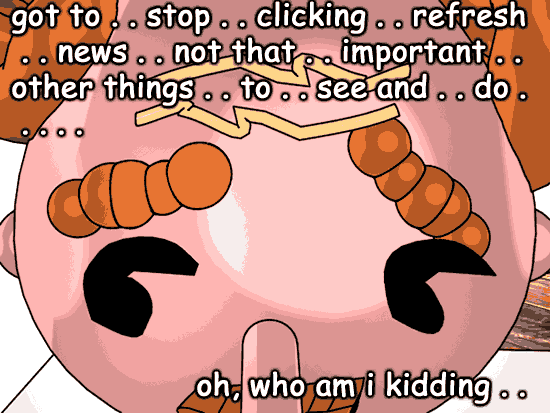 |
Hi. It's me.It was this past January that I sold my old Amiga.
I know you're out there. I know you're working as fast as you can to catch me. I thought I should call and let you know how things stand. I know you're real proud of this world you've built, the way it works, all the nice little rules and such, but I've got some bad news.
I've decided to make a few changes .....- Neo, The Matrix (original shooting script)
There remains
a tendency among the vendors and the mainstream press to slam emulation
almost as hard as they do computer hacking. I frankly have never
considered computer hacking to be the disrespectful profession for which
it is often portrayed. If I recall my high school English classes
correctly, a "hack" was a writer who got the knock-off or odd jobs that
nobody else wanted. They had to be fast in order to meet deadline,
yet their work had to be good enough to pass muster with the public.
So it is today with the "hacker" - the digital reincarnation of the "hack"
writer. There's nothing dishonorable about being a hacker.
It's just that the nature of the profession requires you to think outside
the box and beyond the accepted parameters almost all the time, and it
takes considerable skill to be a good hacker.
Yes, it is true
that there are a few renegades who give hacking a bad name, but not all
hackers are evil teenagers or unprincipled college students whose sole
purpose in life is to somehow break into the CIA's mainframe and uncover
the truth behind the Roswell Incident. Hackers have their own ethics,
their own morals (yes, they do, believe it or not), and their own code
of honor. The emuscene owes hacking a debt of gratitude, because
it would never have existed had not a now-forgotten IBM customer back in
the early 1960s hacked his mainframe in order to run programs it wasn't
designed to execute. That story is what supposedly gave Larry Moss
the idea for emulation, and hacking has remained an integral part of the
emuscene even since. In fact, the commercial emulators are by far
outnumbered by hacker products, and the latter are often just as good as
or in some cases even better than what the big boys produce. The
same is true for the rest of the computer industry - almost all real innovations
can be traced back to creative hacks cooked up on the spot or in a flash
of inspiration by an inspired hacker (or a closet one). You want
to know something else? Even the big boys, such as Steve Jobs and
Bill Gates, have hacking in their blood. It's part of the industry.
It's not going away. There has been hacking in the past, hacking
continues in the present, and hacking will go on in the future. I
just wish that for once we could get the mainstream to understand that,
instead of focusing on the few bad apples that bounce out of the barrel.
I hope that in
some future time, when computer historians look back and are forced to
come to grips with the emuscene of our day, that they will give proper
credit to the emucoders in our midst. These überhackers have
managed to recreate complete vintage systems entirely in software (in many
cases), allowing old programs to run on new hardware. That's no small
feat, believe me. You emucoders know what I'm talking about.
Those of you who have worked with them know just how much time and effort
goes into their projects. Those of you who patronize your favorite
emulators appreciate their efforts. It's such a shame that there
remain so many who would rather snipe away at what they blithely label
as "illegal emulation" rather than become involved and get up close and
personal with the emuscene. I have had the good fortune to do that
just these past two years, and I am enriched thereby. The emuscene
has reinvigorated my love for the machine, has restored my delight in experience
the joy of artful programming, and allowed me to once again relive the
highlights of computer days gone by. It's our shared heritage that
the emuscene is saving. No matter that certain vendors can't see
beyond the buckles of their money belts. What they think doesn't
matter in the long run. What they provide will outlast them, so long
as there remains some means to preserve and present on tomorrow's technology.
You can't save
live code in cold print. You can't capture the essence of the program
presentation in static media. No, you have to recreate the entire
experience, both the good and the bad, as best as programming skill and
available resources will permit, so that current and future generations
will better appreciate just how far we've come. There's really only
one way to do that that remains constant, giving the rapid changes in computer
technology, and that is the art of emulation. Time will pass, memories
will fade, and machines will crumble away, but the code will survive.
Long after we are all dead and gone, the code will still be there for some
future computer user to rediscover and say, "Wow! They did that
back
then? Neat!" Think I'm crazy? Perhaps ...
but just look at how today's users are rediscovering the vintage treasures
of our past. The code will survive, for thanks to the emuscene, it
will never die.
I find it rather
ironic that the company who opened the Pandora's box on noninfringing technology
back in the early 1980s is the same that has brought about the legalization
of emulation. Sony, the inventors of the Betamax, who fought long
and hard to justify its existence against a resolute foe, also fought equally
hard some two decades later in order to stop the same thing from happening
to them. They failed, in part to their own successful actions in
the past, and emulation is now legal as a result. Emulation is
legal. It still gives me chills whenever I say that. I
knew it instinctively, as did we all, back in the dark time when I set
out to prove that it was actually true. You know, in a way, it's
sad that the one company who had originally championed a form of noninfringing
technology didn't want the same yardstick applied once their turn came.
"Not in my backyard," as the old saw goes. Well, so much for their
efforts. They were doomed from the start, as I knew they would be,
but rest assured that I impatiently waited, perched on the edge of my seat,
along with the rest of you. Would I be proven right, or would the
unrestrained use of emulation technology be forever hobbled by monopolistic
vendor desire? It was fortunate that things turned out the way that
they did, and a royal screw-up by one of our greatest foes has turned out
to be our unlikely salvation. We have Sony to thank for the legalization
of emulation, just as we have Sony to thank for the legalization of audiovisual
broadcast recording. Who would have thought it?
You want to hear
something almost equally strange? How about Nintendo taking part
in the emuscene? Sega, yes - they've always been there for us - but
Nintendo? Who would have thought that, too, back during the time
when Nintendo was going after anybody and everybody who even so much as
dared to discuss emulation of their systems? Yet here we are in the
year 2000, and RandNet is getting ready to set up a commercial NES ROM
site for paying Nintendo customers. I can only imagine how much it
took for them to even consider the possibility in the first place, so my
hat's off to them. I know it's not as big a step as some of you would
like to see, but give them credit anyway. It took a lot for them
to go even that far. Let's hope that this tentative step leads to
even bolder moves in the near future, but they won't do it unless there's
something in it for them. Only your patronage and support will encourage
them to continue, otherwise they'll pop right back into their shell faster
than you can say Nintendo Entertainment System. If that means
going to their website and paying them for their ROMs, then so be it.
Oh, and while you grit your teeth and mumble about having to pay for computer
games that are long past their heyday, remember that it wasn't very long
ago that Nintendo was busting one ROM site after another. It pays
to have at least one legal Nintendo ROM site, even if you have to pay Nintendo
to use it.
Speaking of which,
as this is my final address to the emuscene, I would like to thank Sega
for its unspoken support of my activities all this time. You were
always there for me, even during those days in which I questioned whether
or not I could continue at all, and it was largely due to people who work
with you, who know and love your systems and your software, that I was
able to continue. You never objected to my efforts, even though they
involved unlicensed emulation, and you have given me a straight answer
to every question I have ever asked. You have never been afraid of
the promise that emulation holds, and you have been willing to stick out
you neck time and again in unceasing quest of its potential. Such
effort deserves to be rewarded, and I have done so in more than words alone.
In the past two years, I have purchased over US$2000 worth of Sega products,
and it is a trend that will no doubt continue into the foreseeable future.
It's like the old adage says, "You scratch my back, and I'll scratch yours."
Some of that money might have gone to your competitors, but they have as
yet to show any evidence of your class. It's not big by your multimillion
dollar standards, and is not as much as I would have liked to give, but
I have done what I can. I wish I could do more, but other tasks draw
me away. Perhaps, once all is said and done, I might be able to come
back and pick up where I have left off. I had seven years of catch-up
to do last time. Let's hope it's not nearly as much should next time
come.
I now find myself
viewing the emuscene from a distance, no longer playing the front line
role that I once so thoroughly enjoyed. My part in the great emulation
debate is now over. I set out to prove that emulation was a legitimate
practice, and the U.S. Court of Appeals has affirmed my assertions as legal
fact. Having fought and triumphed, it is now time for me to move
on.
I have no doubts
that I may pop back in now and again, watching the Second Golden Age of
Emulation unfold, but not for long and never in the prominent role that
I once played. This is not my time. I was part of the First
Golden Age, from its glorious inception back in those heady Amiga days
up to the recent dark times. I saw the paradigm shift taking place.
I saw my fellow emufans suffering from a lack of knowledge and direction
at the hands of those who would take full advantage of the situation.
I drew a line in the sand and said, "Enough." I helped my fellows
in their time of trial, and in so doing helped usher in the Second Golden
Age. I guess that makes me a midwife or attendant of sorts, if anything,
but I'm not alone. As I have stated time and again, mine was but
one small part among many. It just happened to be more vocal and
therefore more visible than others who deserve more recognition than I.
Yes, you are
now witnessing the unfolding of the Second Golden Age of Emulation.
The first began with A-Max and the nextgen machines of the 1990s
- the Amiga, the Macintosh, the Atari ST. The second age comes as
personal computers undergo yet another convulsive revolution in capabilities
- the G4 PowerMacs, the Windows 2000 and Linux boxes, the 128-bit
videogame consoles, and so on. We have passed yet another threshold,
a new virtual explosion in computer technology is upon us, and the trend
will continue as surely as the one terabyte hard drive will soon inhabit
our desktops. New technology. It is at the heart of each successive
paradigm shift that catapults the computer industry to new and lofty heights
every five to ten years or so, and it is carrying the emuscene right along
with it. New emulators will be required for the new systems.
New projects will be undertaken at emulating the old systems on the new
ones. New efforts will be made to preserve old code and make it work
with these new systems. It's going to be a wonderful time, just like
it was back in the early 1990s. It's the dawn of a new age for the
emuscene - the Second Golden Age of Emulation. My only regret is
that I will not be here to enjoy the full fruits of our shared labors.
You see, change
is at the heart of humanity. One of my all-time favorite quotes on
the subject was uttered as an admonition by Duke Leto Atredies to his son
Paul in the movie version of Frank Herbert's Dune. "Without
change, something sleeps inside us and seldom awakens. The sleeper
must awaken." My time in the emuscene has been long, eventful, and
ultimately enjoyable, but the sleeper has awakened for another cause.
New opportunities await, new fields of battle beckon, and others in desperate
straits cry out for someone to aid them in their fight for justice.
I know I can help them. I've done it before, and I'll do it again.
As long as the cause is just and the means exist, I will always resist
those who would repress others in any way. The Goliaths of this world
will never last so long as there remains at least one David to take his
sling, pick up five small stones, and walk unflinchingly towards his seemingly
invincible foe. My sling is in hand, and my pouch is full.
It's time for the next challenge. The road is unfamiliar, the foe
untested, but my resolve is no less strong that it was here. Be that
as it may, though, I leave the future of the emuscene in good hands.
I know that my place will not remain empty if need requires. I was
but one David among many, and others will surely rise to combat the challenge
should the emuscene ever suffer such travails again. Your foes may
be different, your battlefield digital instead of physical, but your determination
and desire will be no less strong than those in the physical world.
You will someday triumph, despite everything that can and will be thrown
at you. You are survivors. You will survive.
Be seeing you.
The old battlefield
which we know only too well lies quiet again, save for the sounds of movement
on its outer edges. Sitting on the horizon just within the line of
sight is the final prize - the last fortress of monopolistic might.
Facing its walls, as far as the eye can see, is a vast host of diverse
peoples, united in common cause against a common foe. From tender
youths to grizzled veterans, from neophyte newbies to hardened hackers,
they stand ready for battle. There can be no doubt about the outcome
now, save for an act of divine providence or utter stupidity. They
have the momentum now. It is their fight to lose ... or win.
The leaders of
the emuscene survey their assembled might as they plan their final stroke.
They are not alone, for three other armies stand ready to join the fray.
There are the legions of the black army, the freebooters and mercenaries,
who are only their to take advantage of the situation, but the emuscene
does not scoff their aid. There is a host of renegade vendors, far
larger and stronger than even the emuscene had initially hoped, who have
seen the truth of the cause and joined their fates to it. Finally,
there is a crack battalion of federal troops waiting in reserve, who entered
the affray unlooked-for in the emuscene's greatest hour of need and helped
it win the field. They will not join the fight unless absolutely
necessary, but their aid is no less welcome. The forces of free emulation
are thus far stronger than even their dwindling foes had ever dreamed.
It is an uneven fight against a desperate and well-entrenched foe, but
one from which the emuscene does not shirk. Even so, it will take
courage and skill to manage such disparate hosts and unite them in common
cause. The emuscene now has the means to win the emulation war.
Victory can be theirs for the taking, provided that they have the will
and resolve to seize every opportunity, whatever the cost may be.
Suddenly there
rings forth a shout from the front of the host, and a lone warrior stands
forth before the fray. A grizzled veteran, he is but one of the many
who have led the charge in the emulation war, and his is the honor of launching
this, the final assault in a long and vicious campaign. With one
hand he slide-cocks his shotgun, and then slaps the other into place on
its grip. He surveys his fellows as he grins with delight, chomping
down on the half-burned cigar sticking out of one side of his mouth, then
utters the final call to arms.
"Let's rock!"
I have, myself, full confidence that if all do their duty, if nothing is neglected, and the best arrangements are made, as they are being made, we shall prove ourselves once again able to defend our Island home, to ride out the storms of war, and to outlive the menace of tyranny, if necessary for years, if necessary alone. ... [W]e shall not flag nor fail. We shall go on to the end, we shall fight in France, we shall fight on the seas and the oceans, we shall fight with growing confidence and growing strength in the air, we shall defend our Island, whatever the cost may be, we shall fight on the beaches, we shall fight on the landing grounds, we shall fight in the fields and in the streets, we shall fight in the hills; we shall never surrender, and even if, which I do not for a moment believe, this Island or a large part of it were subjugated and starving, then our Empire beyond the seas, armed and guarded by the New World, with all its power and might, steps forth to the rescue and the liberation of the old.
- Sir Winston Churchill
"Dunkirk," Blood, Sweat, and Tears